104 years ago today, Coco Chanel debuted her “No. 5” perfume, as revolutionary a fashion-fragrance as was every made. Smelling unlike anything that until then had been sold, and hoping to appeal to the free-wheeling, flapper culture of the 1920s, the glass bottle, rather than appearing as an over-elaborate crystal vial, was inspired by a whiskey decanter. Andy Warhol chose to commemorate its iconic status in the mid-1980s with his pop art, silk-screened, Ads: Chanel. READ more about the famous fragrance… (1921)
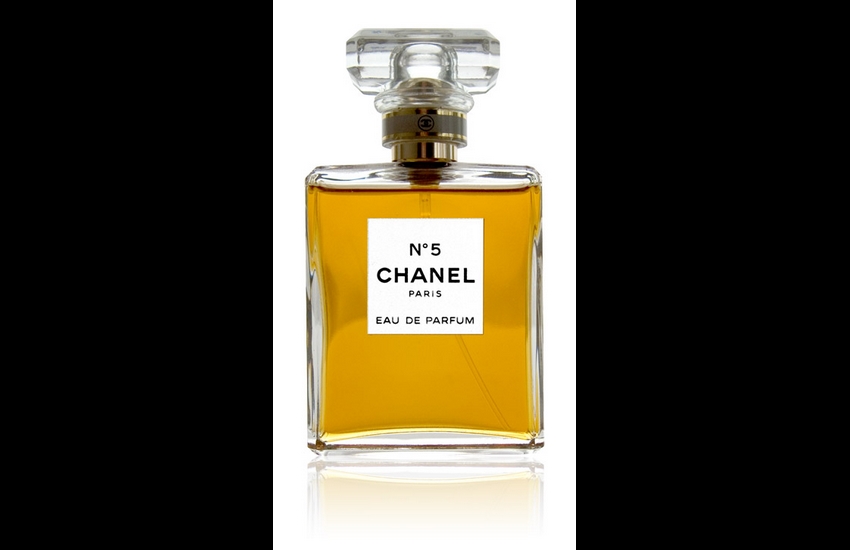
Chanel had been followed, somewhat, by the number 5 throughout her life, or at least she felt that way. The paths that led Chanel to the cathedral at the nunnery where she came of age from 12-years-old were laid out in circular patterns repeating the number five, and she found that five repeated itself in that environment—in rock gardens and cloisters.
When given a selection of bottles the one which eventually became the famous Chanel No. 5 happened to be in the fifth one. “I present my dress collections on the fifth of May, the fifth month of the year and so we will let this sample number five keep the name it has already, it will bring good luck,” she is supposed to have said.
MORE Good News on this Day:
- Cy Young of the Boston Americans threw the first perfect game in the modern era of baseball pitching against the Philadelphia Athletics at the Huntington Avenue Grounds, (1904)
- Michael Palin, the English comedian from Monty Python and A Fish Called Wanda was born in Sheffield, Yorkshire (1943)
- Prague uprising began against German occupying forces in Czechoslovakia (1945)
- US Army troops liberated the Mauthausen concentration camp in Austria during World War II (1945)
- Billboard’s Top 100 chart debuted 65 years ago with Elvis Presley premiering at the top of the list on Heartbreak Hotel (1956)
122 years ago today, one of the most influential chefs in American history, James Beard, was born in Portland. His towering success led to the creation of a foundation that gives out the James Beard Awards—the most coveted in American cuisine. Beard emphasized American cooking, prepared with fresh, wholesome, American ingredients, to a country just becoming aware of its own culinary heritage. Beard taught and mentored generations of professional chefs and authored two dozen cookbooks.
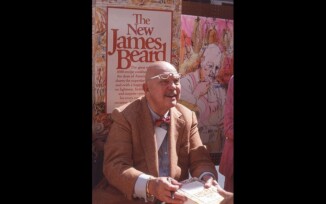
A true immigrant story though not regarding Beard directly, a bout of malaria at age three gave him time to focus on the food prepared by his mother and Jue-Let, the family’s Chinese cook. According to Beard, he was raised by Jue-Let and Thema, his Chinese nanny, who instilled in him a passion for Chinese culture and food.
Traveling Europe after high school switched his passion for Chinese culture to the French after becoming aware of French gastronomy. And the rest they say is history, as the following 50 years saw James Beard gradually become one of the most respected food personalities in the country by combining the tradition of French cuisine with the multiculturalism and boundless enthusiasm of the American people.
Julia Child eulogized the man thusly:
“Beard was the quintessential American cook. Well-educated and well-traveled during his eighty-two years, he was familiar with many cuisines but he remained fundamentally American. He was a big man, over six feet tall, with a big belly, and huge hands. An endearing and always lively teacher, he loved people, loved his work, loved gossip, loved to eat, loved a good time.” (1903)
52 years ago today, ridden by Ron Turcotte, Secretariat won the Kentucky Derby in 1 minute 59 seconds and 40 milliseconds, the record which stands today. No horse could manage to run the Derby in under 2 minutes for another 30 years until Monarchos managed it in 2007.
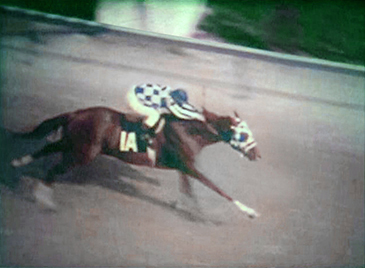
The 1973 Kentucky Derby attracted a crowd of 134,476 to Churchill Downs, then the largest crowd in North American racing history. The bettors made the entry of Secretariat and Angle Light the 3–2 favorite, with Sham the second choice at 5–2.
On his way to a still-standing track record, Secretariat ran each quarter-mile segment faster than the one before it, meaning he was still accelerating by the final quarter-mile of the race. Here’s what sports writer Mike Sullivan had to say.
“He [Secretariat] started in last place, which he tended to do. I was covering the second-place horse, which wound up being Sham. It looked like Sham’s race going into the last turn, I think. The thing you have to understand is that Sham was fast, a beautiful horse. He would have had the Triple Crown in another year. And it just didn’t seem like there could be anything faster than that.”
“Everybody was watching him. It was over, more or less. And all of a sudden there was this, like, just a disruption in the corner of your eye, in your peripheral vision. And then before you could make out what it was, here Secretariat came. And then Secretariat had passed him. No one had ever seen anything run like that—a lot of the old guys said the same thing. It was like he was some other animal out there.” (1973)
64 years ago today, Alan Shepard became the second person, and first American to depart the Earth, making it to low-Earth orbit in his capsule called Freedom 7, as part of a mission called Mercury-Redstone 3. Unlike Yuri Gagarin, Shepard had some control of the spacecraft when he climbed an altitude of 116.5 miles; 187.4 kilometers.
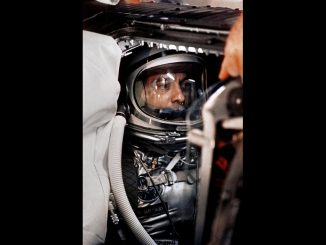
On the day of, the astronaut-to-be awoke at 01:10, and had breakfast consisting of orange juice, a filet mignon wrapped in bacon, and scrambled eggs with his backup, John Glenn. After waiting in the capsule on the launch pad for 2 hours, he had to pee in his suit, which had no artificial bladder. The whole flight was done in a urine-soaked base layer.
According to Gene Kranz in his 2000 book Failure Is Not an Option, “When reporters asked Shepard what he thought about as he sat atop the Redstone rocket, waiting for liftoff, he had replied, ‘The fact that every part of this ship was built by the lowest bidder.'”
Shepard was celebrated as a national hero, honored with ticker-tape parades in Washington, New York, and Los Angeles, and received the NASA Distinguished Service Medal from President John F. Kennedy. He was also awarded the Distinguished Flying Cross. (1961)
134 years ago today, Carnegie Hall held its grand opening, featuring the great Russian composer Tchaikovsky as guest conductor.
The extraordinarily large concert venue in a quiet neighborhood (before Midtown Manhattan blossomed), eventually became one of the most prestigious theaters in the world for both classical and popular music—and a National Historic Landmark.
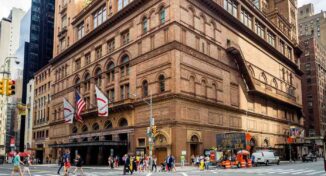
At 881 Seventh Avenue and West 57th Street, the building with 3 concert halls was built by philanthropist Andrew Carnegie and today hosts 250 performances each season. The grandest of the three theaters is six stories high with 5 levels of seating for up to 2,804 people.
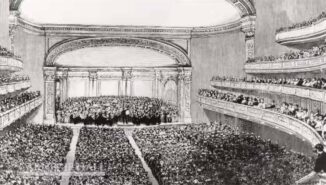
Home for decades to the New York Philharmonic, its lobbies are adorned with signed portraits and memorabilia that feature Arturo Toscanini, the debut of 25-year old Leonard Bernstein, and memories of stars who recorded iconic live concerts there—Duke Ellington, Billie Holiday, Tony Bennett, Judy Garland, Simon and Garfunkel, Chicago, James Taylor, Stevie Ray Vaughan, and many more.
The hall has also been the site of famous lectures, including Booker T. Washington, and the last public talk by Mark Twain—both in 1906.
Rock and roll first arrived in 1955 with Bill Haley & His Comets. Years later, The Beatles, newly arrived in the U.S., played two shows there and Led Zeppelin, a decade later, became the first hard rock act to plug in their amps into the magnificent Carnegie Main Hall. WATCH a cool tribute… (1891)
Today is also Cinco de Mayo (Fifth of May, in Spanish), the Mexican holiday celebrating the victory of Mexican patriots led by General Zaragoza over invading French forces in the Battle of Puebla on May 5, 1862.
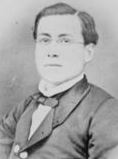
It was a classic David and Goliath tale that led to an eventual victory for the U.S.–backed Mexicans. 6,500 French soldiers sent by Napoleon III, confident of a quick victory, marched to Mexico City to seize the capital. However, Zaragoza’s ill-equipped militia of 4,500 men, plus a small but nimble cavalry, crushed the better-armed French soldiers in muddy and inhospitable terrain, with a combination of tenacity and a cattle stampede set off by locals. The French invasion resumed two years later and 30,000 new French troops toppled the Mexican army. However, once the American Civil War had ended, the U.S. began supplying Mexicans with weapons, ammunition and volunteers, and by 1867, the French were finally defeated and their puppet head of state deposed.
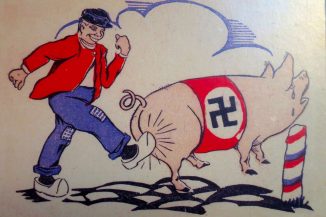
Today is Liberation Day (Bevrijdingsdag) for the Dutch people—a national holiday celebrated in the Netherlands to mark the end of the German occupation by Nazi forces during World War II. It was 76 years ago today that Canadian and British forces—along with Polish, American, Belgian, and Czechoslovakian troops—liberated the country. (1945)

And, Happy 37th Birthday to Adele, the popular British singer who rocketed to stardom at age nineteen when she released the four-times platinum album “19” and won the Grammy Award for Best New Artist in 2009.
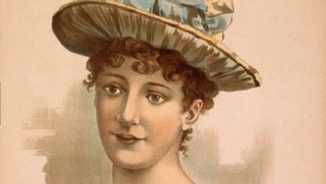
And, on this day in 1809, a US patent was awarded to a woman for the first time. In that American era, females could neither own goods nor enter into contracts, so why pursue a patent? Because a Connecticut woman named Mary Kies invented something worth patenting, reports the Smithsonian.
During an embargo of imports from England that stifled fashion, she came up with a technique of weaving straw with silk and thread—a method that allowed her to make and sell beautiful hats, which, after the patent was awarded, no one else could copy. The polished bonnets became a huge fad—and President James Madison signed Kies’s patent while First Lady Dolley Madison loved the idea of furthering women in industry, so said ‘hats off’.
SHARE the Milestones, Memories, and Music…



















